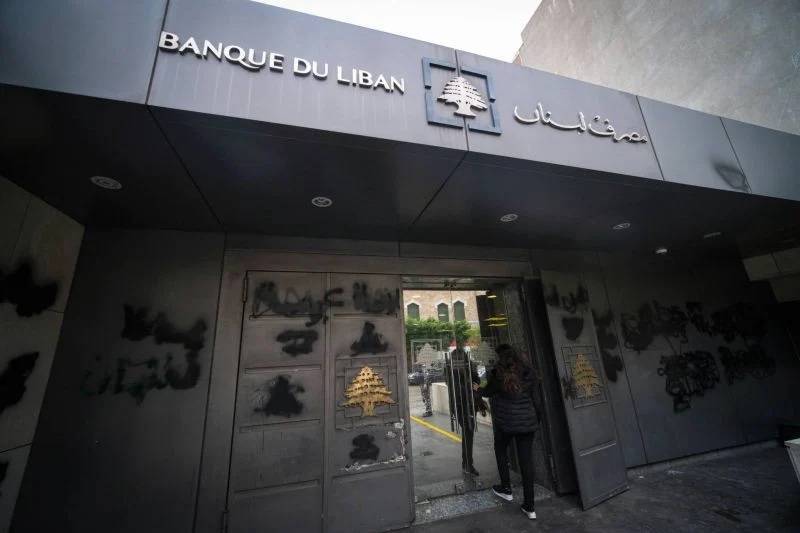
The Banque du Liban headquarters in Beirut. (João Sousa/L'Orient Today)
Want to get the Morning Brief by email? Click here to sign up.
Following a Banque du Liban intervention, the lira recovered to LL110,000 against the dollar after the morning’s LL20,000 drop in value — the sharpest loss recorded in a single day — to a new all-time low of LL140,000. Protesters yesterday morning blocked roads in Beirut, Tripoli, Baalbeck and South Lebanon to protest the rapid depreciation. Meanwhile, several money exchange shops were also refusing clients Tuesday morning. Shortly after the currency hit a new record low, BDL adjusted the Sayrafa rate by LL6,250 to LL90,000, allowing people to convert lira to dollars at the stronger rate at “Category A” money exchangers — an operation previously limited to commercial banks, which relaunched their open-ended strike last week. In 2019, there were only about 10 money exchangers holding a “Category A” license, which allowed them to exchange different currencies for dollars. BDL’s statement promised those who opt for the Sayrafa conversion to “get back dollars three days later,” though the process has received criticism for payment delays and for ultimately not being useful enough to quell further depreciation.
Blom Bank and Bank of Beirut representatives told L’Orient Today this morning that their branches were open “as usual,” after the Association of Banks in Lebanon (ABL) announced yesterday evening that it would suspend its weeks-long strike starting Wednesday. ABL had launched the strike in early February to protest legal proceedings against some banks, though reopened services for two weeks in late February as employees across the country needed to withdraw their monthly salaries. The decision to reopen banks this week came "on the occasion of the beginning of the month of Ramadan and to facilitate the operations of citizens,” as banks seek to address the legal cases against them. Ramadan, a holy month of fasting and family sunset meals for Muslims worldwide, is set to begin on March 23.
Pharmacists’ syndicate head Joe Salloum called on pharmacies to reopen today, averting a strike after reaching a deal with importers and distributors of drugs to maintain a “continuous” supply of medicine. According to the new agreement, drug suppliers will list medicine prices in lira and the exchange rate used, the pharmacists’ syndicate said in a statement. They also called on the implementation of a regularly updated price index for medicines. Salloum urged pharmacies to close yesterday, decrying “the almost total halt of drug deliveries to pharmacies by companies for over two weeks.” He asked pharmacies to remain closed “until the drugs are delivered again,” regardless of decisions taken by the government, which according to the statement, faced the ongoing medicine shortage with “indifference.” Regardless, most pharmacies remained open throughout Tuesday. A similar strike was averted last April, despite the quantities received being “insufficient,” Salloum told L’Orient Today. The drug importers’ syndicate last May said that they had suspended deliveries of unsubsidized medicine due to losses caused by rapid parallel market exchange rate fluctuations. Amid a fourth year of economic crisis in Lebanon, citizens are forced to look for medicine abroad, as drug shortages persist.
An Israeli military vehicle hit a landmine along the Lebanese border near Aita Shaab, South Lebanon, injuring three Israeli soldiers. The Hezbollah-owned Al-Manar television station claimed that one of the three wounded soldiers lost one of their legs in the explosion, which according to Israeli newspaper The Jerusalem Post occurred in Shtula, a village about one kilometer northeast of the Israeli border. Israeli bulldozers and soldiers' vehicles withdrew from the scene and engineering works were halted, Al-Manar said, adding that the landmine had previously been planted by Israeli forces. “Landmines remain a serious threat along the Blue Line, as this incident shows,” a spokesperson for the United Nations Interim Forces in Lebanon told L’Orient Today. Unexploded landmines were left behind in some parts of Lebanon after the Israeli-Lebanese war in 2006. The landmines continue to claim victims, typically Lebanese residents. Demining operations conducted by UN teams and the Lebanese Army, however, have cleared many of these devices.
“Sleiman Frangieh is a challenging candidate, as is Michel Moawad. It is time to move towards a compromise,” Progressive Socialist Party (PSP) head Walid Joumblatt said in an interview with the Lebanese daily Al-Akhbar. “We have supported Moawad during 11 electoral sessions. We have not failed him. But we have to compromise,” Joumblatt added, changing his stance on the candidacy of the Zgharta MP, who had been the sole contender, supported by the Lebanese Forces and their allies, against a slew of protest votes during Parliament’s almost-dozen attempts to elect a president. Hezbollah head Hassan Nasrallah and Parliament Speaker Nabih Berri, whose parties had been casting blank votes in concert with the Free Patriotic Movement and their allies, announced their support for Frangieh last month. The protracted presidential vacuum, in effect since Nov. 1, has reportedly prompted international actors to consider sanctioning Lebanese officials deemed responsible for delaying the election of a president, sources involved in the negotiations told L’Orient Today. Joumblatt also refused “bartering” for the posts of president and prime minister — a move reportedly favored by France for its pragmatism — claiming “it will include everything: the post of the governor of the Banque du Liban will be taken by its Shiite deputy governor, just as a Christian ended up at the General Security.”
In case you missed it, here’s our must-read story from yesterday: “How much will fattoush cost at the start of Ramadan?”
Compiled by Abbas Mahfouz